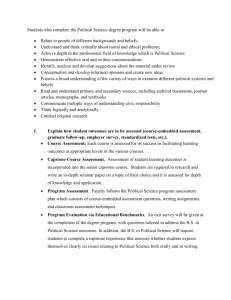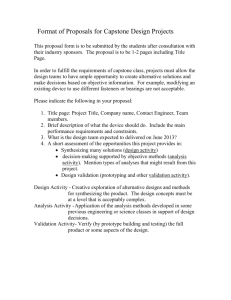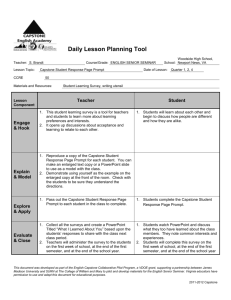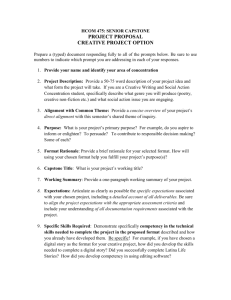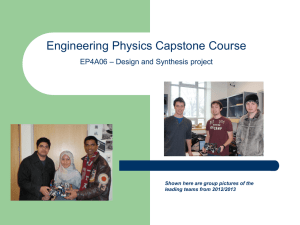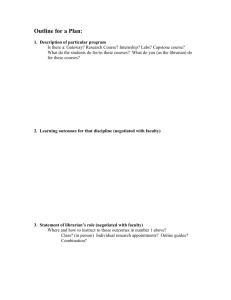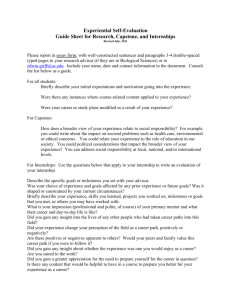MGT 4800J: Business Strategy Section 104 Dr. G. Christopher
advertisement
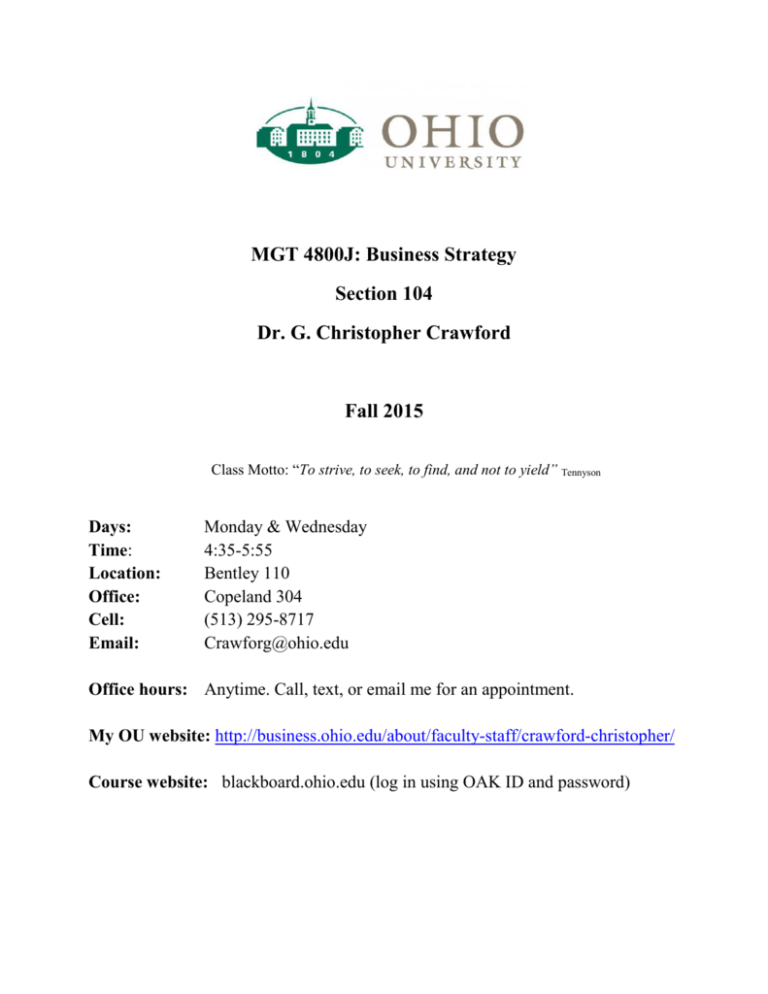
MGT 4800J: Business Strategy Section 104 Dr. G. Christopher Crawford Fall 2015 Class Motto: “To strive, to seek, to find, and not to yield” Tennyson Days: Time: Location: Office: Cell: Email: Monday & Wednesday 4:35-5:55 Bentley 110 Copeland 304 (513) 295-8717 Crawforg@ohio.edu Office hours: Anytime. Call, text, or email me for an appointment. My OU website: http://business.ohio.edu/about/faculty-staff/crawford-christopher/ Course website: blackboard.ohio.edu (log in using OAK ID and password) PREREQUISITES FIN 2400, MGT 2100, MIS 2020, MKT 2400, MGT 3200 (or concurrent), SR 470J (not BA470J) REQUIRED COURSE RESOURCES You are responsible for seven readings in a coursepack, which you must download from the Harvard Business School Publishing website: https://cb.hbsp.harvard.edu/cbmp/access/38724402. As well, you must register for CAPSIM Capstone business simulation at www.capsim.com, using Industry ID: C73830. Additional modules and examinations are provided with your registration. SIZE MATTERS Why is this syllabus so long? A syllabus is like any other contract: I offer it to you, and you can decide whether to accept it or to provide a counter-offer. Since we don’t have the time to debate the finer points, there isn’t a lot that you can counter. So, the extra information raises the procedural justice of this class by 1) providing a foundation for why things are the way they are, and 2) identifying some specific ways that I will achieve the learning outcomes set below and help you succeed. This information will shape your expectations for future events and allow us to smoothly progress throughout the semester. COURSE DESCRIPTION This is a capstone course, meant to integrate the most salient information from all of your previous courses. MGT 4800J is designed to present strategic management from the point of view of the practicing general manager. It focuses on specific knowledge and skills that are required to understand strategy and the processes by which it is developed in business organizations. This is a “J” (Journalism) course, so there is a significant writing component associated with successful completion. The course will integrate knowledge and skills developed in the lower division courses of the program, but that is not its only goal. Students are expected to combine knowledge from other courses with information presented here to develop sophisticated interpretations and analyses of both actual and simulated business problems and opportunities. Students will prepare written reports—both as an individual and as a team. The expected level of quality and professionalism of the content and presentation of these reports will be that used in actual business organizations. A big part of all this will be encapsulated in the business strategy simulation. Capstone® by CAPSIM is a simulation of competitive dynamics in the sensor industry. Running a business requires the development and execution of strategies and tactics. Capstone® allows students to test their skills by taking over a simulated company with a unique product in each of five market segments. To build a profitable and sustainable enterprise, this interactive experience requires decisions in production, research & development, marketing, and finance. Other challenges include total quality management, sustainability, human resources, advanced marketing, labor negotiation, and ethics. This simulation forces you to ask many questions, including: • • • • With multiple products in various markets, how do we keep up with demands of each? If we modify our product, how long will it take to make it available for purchase? What strategy should we use to stay on top of all our competitors? Can we develop a product that consistently appeals to multiple target audiences? 2 In this simulation, you have the opportunity to test your assumptions about how different pieces of business are connected and interdependent. Here, as an individual and as a team, you get the chance to fail, get instantaneous feedback, and learn from your mistakes. This experience will give you more confidence to execute decisions in your business career. Capstone® is competitive, fun, frustrating, rigorous, and rewarding; you will get out of it what you put into it. COURSE OBJECTIVES This course addresses issues to consider and approaches to use when making decision concerning the strategic direction of an organization. To make such decisions, the decision-maker must develop an accurate assessment of (a) threats and opportunities in the organization’s environment, (b) the organization’s strengths and weaknesses, (c) the top-down and bottom-up expectations from potential stakeholders. The environments in which organizations operate are changing at an unprecedented pace. Accepted management practices are also changing dramatically. This means that we will be dealing with exceptionally complex issues, those that are ripe with globally diverse entities, interdependent actions, and the possibility of extreme events. Given these, there is no one best way to develop and implement strategy; they are, however, better and more appropriate strategic approaches. The purpose of this course is to uncover what makes for better strategies. This is a big-picture course that deals with the work of senior management. As such, the perspective adopted is that of the general manager who must be concerned with the overall success of the organization. We will focus on the perspectives and skills required of the general manager in diagnosing and finding realistic solutions for critical problems in complex situations. The course is designed to raise strategic issues that managers can expect to face. As this is a capstone course, it is purposively designed to be integrative and, thus, you should expect to find and draw upon, concepts raised in other degree classes that you have taken. This section of MGT 4800J is purposefully designed to follow the mission of Ohio University: To be the best transformative learning experience in the country. Transformative learning is inherently difficult because it requires you to change—change the way you think and act and move your life forward. Bass (2012) notes that the college experiences that most highly correlate with the greatest impact on student success, on graduation, on transfer, and on other measures of learning include “high-impact practices,” such as: • • • • Capstone courses and projects Collaborative assignments Writing intensive courses Common intellectual experiences These practices have been shown to induce student behaviors that lead to meaningful learning gains, including: • • • Investing time and effort Interacting with faculty and peers about substantive matters Experiencing diversity 3 • • • Responding to more frequent feedback Reflecting and integrating learning Discovering relevance of learning through real-world application With the simulation, readings, writings, and team-based efforts, this course is likely to be a novel and transformative experience. In short, I utilize high-impact practices because they most highly correlate to powerful learning outcomes. WHY DO I PUSH YOU SO HARD TO LEARN SO MUCH? As I mention on opening day, my overarching objective as a professor is to prepare you for the real world so that you may capture opportunities as they emerge.—the harder I push you, the better prepared you are. This course is especially important to your future because it facilitates alignment between your capabilities and resource provider expectations. As evidence, the 2015 NACE Employer Survey identified the ten most important skills sought by employers: 1. Leadership 6. Analytical / quantitative skills 2. Ability to work as a team 7. Technical knowledge related to job 3. Communication skills 8. Initiative 4. Problem-solving skills 9. Computer skills 5. Strong work ethic 10. Flexibility / adaptability MY BACKGROUND (OR, HOW CAN I HELP YOU LEARN?) I have been an entrepreneur, with consulting clients around the country and around the world. I have been a Director of Marketing, where I had to forge a vision to lead a company out of ten consecutive years of declining sales. I have been a Sales Manager and a Corporate Trainer, where I had to lead a team to build relationships with existing and potential clients as a means of growing an already growth-oriented company. I have been a Professor, teaching students in 14 different courses over the last 15 years to both undergraduates and MBAs, and nominated for teaching awards at three universities. And, finally, I have been a student, graduating from the University of Louisville with a Ph.D. in Entrepreneurship in 2013. In my research, I want to understand how outliers emerge. In my dissertation, I put together a framework to explain and predict the emergence of outliers; the framework is generalizable and can be applied across all social systems—some empirical results from this work has been published in the premier entrepreneurship journal, Journal of Business Venturing. In class, we will use this framework to 1) push you to become outliers in whatever you do, and 2) teach you how to lead others to achieve previously unachievable or yet-unseen outcomes. LEARNING OUTCOMES (OR, WHAT WILL YOU LEARN?) By the end of this course, you should be able to: 1. Integrate the knowledge gained in earlier COB courses. 2. Develop your capacity to think critically and strategically about a company, its business position, and how it can gain sustainable competitive advantage. 3. Build your skills in conducting strategic analysis in a variety of industries and competitive situations. 4 4. Have hands-on experience in crafting business strategy, reasoning carefully about strategic options, using what-if analysis to evaluate action alternatives, and initiating the changes necessary to keep the strategy responsive to newly emerging market conditions. 5. Develop powers of managerial judgment, help you learn how to assess business risk, and provide you with a stronger understanding of the competitive challenges of a global market environment. 6. Think more consciously about the importance of ethical principles, personal and company values, and socially responsible management practices. TEACHING PHILOSOPHY AND METHOD (OR, HOW WILL WE GET THERE?) John Mayer is wrong—there is such a thing as the “real world.” I am here to prepare you for it. My primary goal of this course is for you to be able to apply every topic we cover to your daily personal and/or business life. I approach every class period as one where I have the opportunity to change the world. While that may seem a bit grandiose, know that all research indicates that high expectations lead to high performance; I expect a lot out of myself and a lot out of you. I firmly believe that Natural Laws govern all aspects of life, the most important being the Law of the Harvest: you reap what you sow. We will integrate this law throughout the course by continually building on a solid foundation of ethics and relentless self-improvement. This integration cannot be achieved, though, without your desire and dedication throughout the entire semester. To be successful in this class, it takes a long-term, sustained effort. This is mirrored in the relatively even weighting of all the deliverables, which are assessed at both a team and individual level. Accordingly, I will assign teams the first week of the semester, and I will provide you with the operational and technological tools to optimize your performance. I believe that, because you are here at Ohio University in the College of Business, you are already a high-achieving individual. Since you are a smart, competent student, I feel that I insult your intelligence if I attempt to explain everything I assign to you. If I tell you to read an article, how much value do I add to the following class if I make you sit and listen to me lecture on that chapter, throwing up PowerPoint slides outlining material that you already outlined? The answer: none. Your future boss will never hold your hand like this. So, don’t expect me to. Instead, I teach in a method known as an “inverted classroom.” It stresses that students arrive prepared for each class, where all background readings and tasks are completed prior to arrival. I’ll use the Socratic Method—asking one person continuous questions as a means of deriving answers—to ensure your pre-arrival work is done. Then, the time in class is used to clarify the most important course concepts, to consult on team projects or experiential exercises, or to conduct any other activity that adds value to the material (instead of simply regurgitating it). I operate as a consultant; my job is to add value to your experience. For some, this style of teaching is difficult to grasp at first. For some, this is the class you’ve been waiting for. I prefer a highly involved, active, and multi-dimensional learning environment because it is more effective and more fun. Different approaches give students with different learning styles more opportunities to comprehend and integrate the material – students also prefer it because straight lecturing gets boring very quickly. Traditional lectures offer an equilibrium-based environment: you quickly learn how the course is structured, make minimal modifications of your existing processes to achieve your standard of performance, and settle in to a comfortable niche for the rest of the semester. Multiple methods offer a disequilibrium framework, where I will continually 5 push you to do better and achieve more than you thought possible. This framework requires a very active learning environment and a good deal of effort and focus by all of us. Every student is expected to complete the homework and talk about the readings. Please be prepared every class session to consider questions such as the following: How can the topics be applied to your daily work or personal life? What did you agree or disagree with? What key concepts, theories, or ideas are most relevant? If you read something, I expect you to know it. If you don’t understand it, I expect you to ask me about it. Learning is, by nature, an unobservable phenomenon. We can infer that learning has occurred only through observing behavior. So your active contributions to class will be the primary way for you to demonstrate learning. While “effort” is an important precursor to learning, it is both insufficient and impossible for me to evaluate. True learning is manifested only through behavior. Therefore, the grading in this class will attempt to reflect how well you have communicated what you have learned—not your effort or what you think you “know.” To facilitate your contribution, I will often randomly ask one student to answer a series of questions about the material. It goes without saying that to answer these questions, you must be prepared for every class. Your behavior in class will contribute the majority of your Engagement grade. Change is a given. Class sizes are sometimes different than originally planned and students' backgrounds and personal characteristics often vary from class to class. Therefore, the class requirements, allocation of points, class schedule, or other aspects of the syllabus are subject to change as dictated by the needs of the specific class. In that same vein, I will hand out our course schedule in an outline format on a separate sheet of cardstock to withstand multiple markings throughout the semester. Any changes to the syllabus or the schedule will be announced in class and on Blackboard. You’ll always know about all changes. If for no other reason than contributing to team outcomes, you should plan on attending every class. In accordance with the Undergraduate Academic Standards and Responsibility, students are “expected to attend every class for which you are registered.” Also, “there are no Universityrecognized excused absences except for religious observances that require absence from a class session and other required class activities.” I believe that we as human beings have the freedom to choose everything we do. Not coming to class diminishes the amount of material you will master. Job interviews, illness, studying for another class, extra-curricular activities, family crises, etc., are not considered excused absences—you are choosing not to attend class. I understand that things occur in our lives that are more important than school, but that does not mean that your learning and your grades will not be negatively influenced by your absence. This also suggests that, if you make a difficult (but strong) choice not to attend, there may be some potentialities for alternative assignments to demonstrate your mastery of the material you missed. EXAMS & QUIZZES & PROJECTS AND, WELL, ALL DELIVERABLES Life is a cumulative exam, and so will all of your tests. Examinations will primarily be multiple choice, with a few short essay questions. There will be five or six or maybe ten unannounced quizzes throughout the semester. The quizzes will be relatively easy, provided that you adequately prepared for class. Some will be taken individually and some will be taken as a team, members of which you will work throughout the semester. To facilitate your ability to produce deliverables at the highest level, I will provide initial guidance with proven frameworks and/or examples from my own company or from industry experts, as well as a rich set of supplementary 6 materials, should you decide to deepen your understanding. The interactions with team members and the supplementary materials offer the opportunity to improve your performance in this course (and other courses) at a pace and scale beyond traditional, linear increments. Deliverables are the measurable things that you do throughout the course; these must be presented on the day they are assigned. If you will be absent, it is acceptable to e-mail an attachment to me before class so that you can receive credit. Late, incomplete, or missed assignments will be graded as a zero; there are no make-ups. COURSE STRUCTURE Attendance A significant amount of your learning will occur in the analyses and discussions that take place in the classroom. It is not, therefore, possible to make-up for a missed class. Consequently, you are expected to attend every class; please be prompt so that we can start and finish on time. More than one unexcused absence will negatively affect your grade. Because a significant portion of your grade is earned in a team environment, you need to be in class in order to be able to play a full role in your team’s activities. Therefore, 1) you can receive a maximum of 60% on your Engagement score, and 2) your teammates will have sufficient grounds to fire you from the team if you miss more than four classes. Preparation For an effective learning process, it is vital that you spend time carefully preparing before class. This will allow you to actively participate in the discussions that will form a vital part of the learning process. At various times you will be expected to start a discussion or answer a specific question, so unless you have thought about and adopted a personal position on relevant issues, it is difficult to contribute to, and learn from, the other members of the group. If the thought of starting such a discussion makes you feel particularly uncomfortable, please talk to me. I encourage you to spend time before class discussion various positions with other members of your team. A sound preparation for the class will also consist of reading the assignments before we discuss them in class. Quizzes (i.e., opportunities to show off your skills) will be given at the start of randomly selected classes to ensure that this requirement is met. I expect that you will: • Engage: Invest time and effort in understanding the principles of strategic management • Take responsibility for your own learning • Check, at least daily, established communication mechanisms (e.g., e-mail) • Attend all lectures, and complete the assigned tasks and readings within the specified time frames • Notify the course leader if circumstances prevent the completion of any assigned readings or tasks, or attendance at a particular lecture • Communicate any difficulties that might impair learning or academic performance • Follow the guidelines provided for the submission of written work • Provide constructive feedback to the instructor regarding the content and delivery of the course 7 You can expect that I will: • Provide a course outline that clearly states the objectives of the course • Provide a weekly breakdown of the course content, reading requirements and any tasks • Provide a program of study that is challenging, intellectually stimulating, and allows for opportunities to analyze practical and theoretical aspects of management • Provide a clear indication of the forms of assessment, dates for exams, and submission of written work • Create a climate that enhances student learning and achievement and is conducive to the open sharing of ideas • Maintain flexible office hours and be available for appointments to provide opportunities for the discussion of areas of interest and/or difficulty The last two pages of this document has a coarsely outlined schedule of the entire semester and a list of all the readings, respectively. I will hand out these two pages on a separate sheet for easier access throughout the semester. ASSESSMENT A great deal of emphasis in this course is placed upon reading, analyzing, and then executing decisions based on the analysis. Your final grade will be made up of the following deliverables, weighted and graded as follows: Quizzes Comp-XM Basix Comp-XM Industry Analysis Paper Capstone® Performance Engagement Final Board Report Final Board Presentation (Pop & Comp-XM Basix V1 & V2) (Individual Mid-Term Exam) (Individual Final Exam) (Individual) (Final Team, Relative to Competition) (Individual) (Team) (Team) 5% 15% 15% 10% 25% 10% 10% 10% Grading Scale A B+ C+ D+ 93%+ 87-89.99% 77-79.99% 67-69.99% AB C D 90-92.99% 83-86.99% 73-76.99% 63-66.99% BCDF 80-82.99% 70-72.99% 60-62.99% Below 60% Quizzes (5%) There will be approximately 3-8 quizzes throughout the semester—some announced, some not. Some quizzes may simply ask you to identify the major points of the readings prior to the start of class. Two of the quizzes, Comp XM-Basix V1 & V2, will help sharpen your Capstone® abilities as an individual prior to operating as a team; these two quizzes will also prepare you for the midterm exam. As well, some quizzes may be in the form of Debriefing Reports. Sometimes this Report will be a quiz that you will take as an individual based on the assignment for the day; sometimes this Report will be an easy verbal quiz that you will take as a team based on your performance in the simulation; sometimes this Report will be presented by one individual team 8 member, and the rest of the team will receive the grade given to the individual. Each quiz will be graded on a 0-100% scale. Most Reports will be assessed at the beginning of class as a springboard to specific topics of discussion. Thus, it is important that you arrive to class on time in order to 1) provide proper context to the class discussion, and 2) receive full credit for the Report, as late submissions will not be accepted and there will be no make-ups offered. Exams: Comp XM-Basix (15%) and Comp XM (15%) These will both be assessed on your individual performance. The mid-term exam will be CompXM Basix, which will assess your general knowledge about the simulation, the integration of business functions, and basic strategic concepts. More specifically, you will start with a company that is struggling to remain profitable, and you will work to turn it around in four rounds (simulated years). This exam is independent of the Capstone® simulation and its results—it will take 2-3 hours to complete. The final exam will be Comp-XM. Here, you will be a CEO of a company in an industry similar to the Capstone® simulation; competitors are managed by the computer. As you run the company, the Board of Directors will present you with a set of questions after each round. The questions are drawn from all business domains, from accounting to marketing, to strategy. Because of the globally competitive nature of this final exam—you will be assessed at the individual, class, and national levels—there is a significant potential to earn extra credit points for superlative achievement. This exam will take six to eight hours to complete. If you miss an exam, no makeup will be possible. Individual Assignment: Industry Analysis Paper (10%) You are a consultant for a diversified investment company considering entry in the sensor industry via acquisition of an existing firm or starting up a new firm. Using the frameworks discussed in class and in the course readings, your assignment is to analyze the underlying structure of competition and the root causes of profitability in the industry. Your paper will integrate an external strategic analysis of the industry of ‘real world’ firms which manufacture pressure sensors and a financial analysis of the six companies competing in the Capstone® Business Simulation. This paper will be a maximum of ten single-spaced pages, and will be assessed on its effectiveness in professionally articulating an in-depth understanding of the industry’s structure, underpinnings of profitability, and relative attractiveness based on both qualitative and quantitative measures. We will have the business librarian, Chad Boeninger, and the Director of the Center of Professional Communication, Cat Penrod, conduct workshops in class to facilitate successful completion of this assignment. This paper will be turned in as a hard copy and submitted as a digital copy to TurnItIn.com to provide you with the most appropriate feedback for future improvement. Engagement (10%) Engagement is focused action working toward a goal. Engagement includes traditionally understood components, like attendance, in-class participation, and displays of superlative preparation, as well as other forms of interactions, like e-mail, text, and depth of feedback about your experience. Engaging in the discourse of the class—through all forms of interaction—allows you to learn from colleagues and to help them learn from you. Accordingly, you are expected to analyze, comment upon, question, discuss, and build upon others’ contributions. 9 Overall, you are expected to BE. HERE. NOW. That means you are in class and working toward the goal—you are engaged. Thus, this also means that if you are checking Facebook on your phone, texting, surfing the web, or working on homework for another class, you are not engaged. Be respectful of my time and the time of your teammates. The ability to present one’s ideas concisely and persuasively, and to respond effectively to those of others, is a key success factor in any managerial position. One of the goals of this course is to help you sharpen that ability. In grading class engagement, I will utilize the following criteria: 1. Relevance – Do your comments speak directly to the issues and concepts being addressed? Do they extend our understanding of those issues or concepts? Do they reflect your adequate preparation to participate in the discussion? 2. Additivity – Do your comments reflect active listening to the comments of other class members? Have they incorporated insights introduced earlier and built upon them? 3. Substance – Do your comments make a real contribution to the ideas being exchanged? Has anything new been gained from your contribution to the discussion? 4. Persuasiveness – Have your points been well articulated, argued, and supported, such that others take note of the convincing nature of your points? 5. Consistency – Has your participation been spread across a number of class sessions rather than concentrated in one or two sessions? 6. Interaction – How much time did you spend analyzing companies in Capstone? Of course, grading engagement is a subjective process, and it is impossible to say there is one “best way” to engage in class. Should you have any questions or comments about your progress, feel free to approach me. Remember, this is a portion of the course that you can actively manage. Capstone® Performance (25%) Your final results will be assessed via a Star Summary, Balanced Scorecard, and your performance according to “Simple Rules.” These will all be team-based scores, where everyone on the team receives the same score. Details on each of these scoring approaches are provided below. Star Summary (10% of Capstone Performance). In the simulation, you earn stars for hitting certain performance benchmarks. Each team can earn a maximum of five stars per round (40 total stars). A star can be earned for each of the following: • • • • • Contribution margin over 30% Zero emergency loans Satisfy 95% of demand and have less than 90 days of inventory Increase in stock price over previous year Profit greater than zero 10 For 32+ stars, you receive 100%. For each star less than 32, score is reduced by 2.5%, as 32+ Stars = 100% 29 Stars = 92.5% 31 Stars = 97.5% 28 Stars = 90%, etc. 30 Stars = 95% Balanced Scorecard (40% of Capstone Performance). The balanced scorecard is a measure of organizational health. While certain parts of the balanced scorecard are tied in some way to the industry and competition, it is feasible for all firms to be healthy (as assessed by this metric). Thus, all firms could do very well and/or all firms could do very poorly. There are 1,000 total balanced scorecard points possible; your percentage score will be calculated as Balanced Scorecard Percentage = (1000 – (1000 – Score)/2)/1000 900 = 105% 800 = 95% 700 = 90% 600 = 85% 500 = 80%, etc. “Simple Rules”: Ending Market Capitalization and Cumulative Profit (50% of Capstone Performance). Research shows that organizational performance improves with a strategy of ‘simple rules,’ where leaders set aggressive, generalizable goals and provide managers and workers the flexibility to figure out the best way to achieve those goals and beat the competition. Jack Welch, former CEO of General Electric made this strategy famous by saying to his managers “Be #1 or #2 in every segment you compete, or your division will be closed.” While the Balanced Scorecard and Star Summary are effective means of ensuring your team is doing a lot of little things right, the Simple Rules principle ensures you are doing the two biggest things right: maximizing the value of your company (measured by market capitalization at the end of eight rounds) and making the most profit (measured by cumulative profit at the end of eight rounds). Your team’s score is calculated relative to the competition, where the 1st place company in each category earns 6 points, 2nd place earns 5 points, 3rd earns 4 points, etc. Both categories are weighted equally. A team that finishes 1st in market cap and 2nd in profit would earn 5.5 points [= ((6 x 50%) + (5 x 50%))]. Since, in the real world, there is no limit on performance, a company that is truly dominant in Capstone® has the potential to earn above-normal points, as 6 points 5.5 points 5 points 4.5 points 4 points 3.5 points = 110% = 100% = 95% = 90% = 87.5% = 85% 3 points 2.5 points 2 points 1.5 points 1 point = 80% = 77.5% = 75% = 72.5% = 70% Ethical decisions will play a large role in all three of the scoring methods. In some of the competition rounds, your team will face an ethical dilemma, explained as a small case study 11 vignette within your normal decisions. Like the real world, these decisions will influence your interactions with current and potential stakeholders, like customers, suppliers, stock holders, and colleagues. Similarly, these decisions have the potential influence your company’s performance (e.g., demand, material cost, productivity, etc.) in the current and future rounds. Thus, you should take these decisions very seriously. Thus, Capstone Performance = ((Star% * 10) + (BS% * 40) + (Rules% * 50)) Final Board Report (10%) Based on your company’s performance during the Capstone® experience, write a final team debrief report to the Company's Board of Directors and shareholders. This seven-page Board Report is not intended to be an academic paper. It should be a truthful account of your company’s effectiveness to the Board. More information on specific content on this Report and the following Presentation will be provided in a separate charge. Final Board Presentation (10%) This presentation should focus on the analysis of your Capstone® market and competition, briefly touching on only the most salient points of your company’s performance at the end of the competition. This will be a 10-15 minute presentation in business-professional attire; expect about 10 minutes of questions from the Directors. Each teammate should expect to present for approximately an equal amount of time. I will hand out a more detailed description of this project later in the semester. Business professional attire is required. THE FINE PRINT I am a big proponent of leveraging resources. Relationships with businesses, professional contacts, internet knowledge bases, and other students are great ways to enhance the quality of your work. However, information from one of these sources passed off as your own is plagiarism, and that will not be tolerated. To plagiarize means to attempt to pass off the ideas or words of somebody else as your own. Plagiarism includes, but is not limited to, the use, paraphrase or direct quotation, of the published or unpublished work of another person without full or clear acknowledgement. It also includes the unacknowledged use of materials prepared by another person or agency engaged in the selling of term papers or other academic materials. This is an academic offence that the University takes very seriously, including failing the course and/or being reviewed by an academic judiciary committee. Keep in mind that both TurnItIn.com and CAPSIM’s Capstone provide extensive tools to identify the inappropriate use of others’ material. Though I inherently trust you, I subscribe to the proverb, “Trust, but verify”. I enforce university regulations, and any flagrant case of misconduct will be prosecuted ruthlessly. So, do the right thing. Don’t cheat. Don’t plagiarize. Ask me if you have any questions. A Note on Team Behavior Peer Evaluations. In order to ensure that each and every member of the team actively participates in completing the assigned work, I will ask for up to three team peer evaluations throughout the semester. These evaluations will allow me to 1) assess your and your teammates’ level of 12 engagement in the course, 2) identify any free-rider(s) on your team, and 3) to reconsider your grade if there is overwhelming evidence that you have been free-riding. Free-Rider Sanctions. One possible sanction for an individual judged as a free-rider is to have team score(s) that are lower than the other members. These scores will be assessed as a function of the magnitude of transgressions against the team, as determined by all other members and the professor. A more severe sanction—imposed by a majority of teammates and/or the professor— would be to have a team member fired. The primary causes of firing include invisibility (e.g., no one has seen or heard from this person) or non-performance (e.g., the team member does not complete work in a timely and/or professionally competent manner). A fired team member is required to either 1) be hired by another team in the same course section with a consensus from the other team’s members, or 2) complete all team assignments alone in order to earn the points associated with all of the team assignments. In addition, a fired employee cannot earn a higher score than the team from which s/he was fired. Students with Disabilities If you have some form of disability that you feel may affect your performance in this course, please contact me, in confidence, as soon as possible. Ohio University and the College of Business adhere to the requirements of the Americans with Disabilities Act. Every reasonable attempt will be made to remove any barrier that may hamper your ability to learn in this classroom. The Office of Institutional Equity requires students to notify instructors if they have a condition that requires accommodation. Emotional and Psychological Assistance We recognize that university life can bring its own stresses and strains. If you feel that you are having difficulties coming to terms with any aspect of your personal, work, or university career, the Counseling and Psychological Services (CPS) is available to OU students who have chosen Wellbeing for the current semester, free of charge. Feel free to talk to me at any time, and/or contact the CPS staff at 593-1616 or visit CPS website at http://www.ohio.edu/counseling/ index.cfm. A 24/7 Crisis Intervention Service is also available at 593-1616. Fostering an Inclusive Environment The Department of Management believes it is important to respond to insensitive and inappropriate behavior in a spirit of collegiality, mutual respect, and professionalism. If you believe that you have been the target of discrimination by another student, a faculty member, or staff member, due to age, disability, ethnicity, gender, race, religious beliefs, sexual orientation, or cultural group membership, you can choose to pursue one or more of the following avenues: 1. The most direct approach, if you feel comfortable doing so, is to speak directly to the person whose behavior you consider to be inappropriate. 2. You may speak to the Instructor, another faculty member, or the University’s Office for Institutional Equity (http://www.ohio.edu/equity). It is important that you speak immediately to someone with whom you feel comfortable in order that your concerns can be handled promptly and fairly. 13 Dr. Crawford’s MGT 4800J Course Rough Draft Schedule & Important Dates* Day, Date Topics & Activities & Assignments Readings & Extras for this Day Mon, Aug 24 Course Introductions: Research & Reality Normal | Numbers Wed, Aug 26 Reading 1 & 2 Strategy Discussion | Team Formation Favorites | R1 & R2 Mon, Aug 31 Finish Capstone “Getting Started” | Team Work Team Member Guide Wed, Sept 2 R3 & R4 Mon, Sept 14 Wed, Sept 16 Mon, Sept 21 R3 & R4 Integration Discussion | Rehearsal Simulation & Situation Analysis Due | COMP-XM Basix Launch Labor Day. No Classes Capstone MKTG, TQM, HR Due | R5 External Analysis Discussion | Industry Analysis Project Launch Penrod Writing Workshop Boenniger Library Workshop Debrief Basix & Project | Basix V2 in Class Wed, Sept 23 Mon, Sept 28 Wed, Sept 30 Mon, Oct 5 Wed, Oct 7 Mon, Oct 12 Wed, Oct 14 Mon, Oct 19 COMP-XM Basix Mid-Term Due EOC Capstone Team Practice Round (PR) 1 Due EOC PR1 Debrief | PR2 Due EOC | R6 & R7 Discussion PR2 Debrief | PR3 Due EOC PR3 Debrief | PR4 Due EOC PR4 Debrief | Team Interim Assessment Capstone Competition Launch Competition Round 1 (CR) Due EOC Wed, Oct 21 CR1 Debrief | CR2 Due EOC Team Consultations Mon, Oct 26 CR2 Debrief | CR3 Due EOC Team Consultations Wed, Oct 28 CR3 Debrief | CR4 Due EOC Team Consultations Mon, Nov 2 Wed, Nov 4 CR4 Debrief | CR5 Due EOC | Team Company Analysis Project Launch CR5 Debrief | CR6 Due EOC Mon, Nov 9 Wed, Nov 11 Mon, Nov 16 Wed, Nov 18 Mon, Nov 23 Wed, Nov 25 Mon, Nov 30 Wed, Dec 2 Fri, Dec 11 CR6 Debrief | CR7 Due EOC No Class. Veterans Day. CR7 Debrief | CR8 Due EOC Team Final Assessment | Team Work Company Analysis Presentations No Class. Thanksgiving Break Company Analysis Presentations Class Wrap-Up | Launch COMP-XM Final Exam COMP-XM Final Exam Due @ 12:20 Mon, Sept 7 Wed, Sept 9 R5 COMP-XM Basix V1 Due B4 Class COMP-XM Basix V2 Due EOD R6 & R7 Capstone TeamMATE Due EOD Individual Industry Analysis Due Mission & Vision Statement Due Team Company Analysis Due *Throughout the semester, I will extensively consult and communicate any changes to this document with you. 14 MGT 4800J Business Strategy Reading List 1 Strategy R1) What is Strategy? (Porter) R2) How Strategy Shapes Structure (Kim & Mauborgne) Capstone Integration R3) Building Your Company’s Vision (Collins & Porras) R4) Digital Ubiquity: How Connections, Sensors, and Data are Revolutionizing Business (Iansiti & Lakhani) External Analysis R5) The Five Competitive Forces That Shape Strategy (Porter) Internal Analysis R6) Three Rules for Making a Company Truly Great (Raynor & Ahmed) Strategic Positioning R7) Why the Lean Start-Up Changes Everything (Blank) 1 Unless otherwise specified, readings are available in the coursepack on the Harvard Business Publishing website, here: https://cb.hbsp.harvard.edu/cbmp/access/38724402 15
